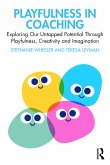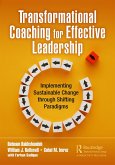Dieser Download kann aus rechtlichen Gründen nur mit Rechnungsadresse in A, B, BG, CY, CZ, D, DK, EW, E, FIN, F, GR, HR, H, IRL, I, LT, L, LR, M, NL, PL, P, R, S, SLO, SK ausgeliefert werden.
Dr Gill Stevens, Programme director - Coaching, University of Cambridge, UK
"Coaching is the personnel development instrument of the future. This handbook provides an excellent practical and scientifically sound foundation for preparing for this future as a coach."
Professor Dr Carsten C. Schermuly, Vice President Research at SRH Berlin University of Applied Sciences, Germany
"This is the go-to book for novice coaches through to seasoned practitioners."
Jeannette Marshall, Director of Accreditation, Association for Coaching (Global)
"A must-read handbook for students, novice and experienced coaches and academics. With the right balance of cutting-edge theory and practice, this is by far the most thought-provoking and comprehensive book on coaching currently available."
Dr Andrea Giraldez-Hayes, Programme Director - Coaching and Positive Psychology, University of East London, UK
"This handbook is a stimulating and eclectic guide to key areas of coaching theory and practice. Presented in seven sections that include discussion of issues, necessary skills and approaches, it makes a most worthwhile addition to the literature base."
Dr Elaine Cox, Senior Lecturer, International Centre for Coaching & Mentoring Studies, Oxford Brookes University, UK
"What a fantastic, science-based practitioners handbook! Great value for all those who want to become dedicated professional coaches helping to unlock peoples' full potential in an increasingly challenging world. An absolute must have for any coaching student!"
Dr Robert Wegener, Co-Responsible of the Coaching Studies FHNW (University of Applied Sciences North Western Switzerland), Initiator of the International Coaching Conference, author and editor, and Business Coach
"As professional coaching begins to reach a stage of maturity, it is crucial we have a credible resource supported by thoughtful and evidence-based reflection. This handbook offers the pathway for sustainable practice and decision-making either for those interested in their development as coaches or for those looking for a reference book in coaching services."
Alexandra Barosa Pereira, Programme Director - Professional Certificate in Executive Coaching, Nova Business School, Lisbon, Portugal
"I love the way this book is like being able to knock on the doors of the individual expert practitioners, and have a chat with each of them, all in one place."
Dr Patricia Bossons, Leadership Development and Coaching Lead, Massey Business School, New Zealand
"The scope and substance of this book make it ideal as a text for coach education and as a resource on every coach's bookshelf."
Francine Campone, Ed.D., MCC, Coaching & Coach Development
"Brings together the current coaching evidence base in an accessible way, supporting coaches to raise awareness and take responsibility for their own development and practice."
Dr Amy Stabler, Senior Lecturer, Leadership Development and Organisation Futures, Newcastle University Business School
"This Handbook covers an amazing variety of illustrations of questions, techniques and tools, issues and approaches in coaching. It is an excellent guide for coaches."
Siegfried Greif PhD, leading German coaching psychologist, researcher and retired Professor, University of Osnabrueck
Review excerpt:
"In addition to coaching theories and models, the handbook includes a vast array of tools, including a selection of 15 traditional and creative techniques ranging from the wheel of life to an example from improvised comedy. The book highlights the importance of professional practice, addressing topics such as the boundaries of coaching, its future as a profession and a leadership style are covered across several sections and chapters. At the beginning of the book, readers are invited to complete a thought-provoking comparison table between coaching and other types of goal-setting interventions. There is a strong emphasis on promoting coaching as a successful evidence-based practice. Authors argue that not only is coaching an effective learning and development approach, able to generate a range of individual and collective benefits, but it also helps deliver changes for organisations at a strategic level."
Francoise Orlov, Philosophy of Coaching: An International Journal, Vol. 6, No.2, November 2021, 47-48. http://dx.doi.org/10.22316/poc/06.2.04









